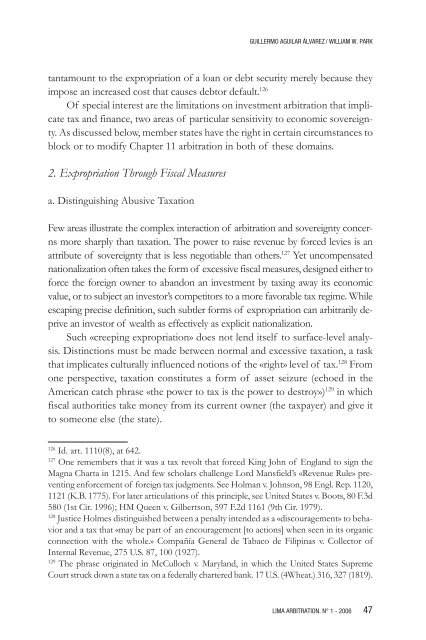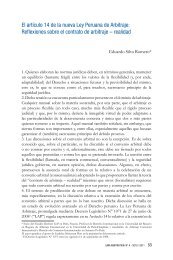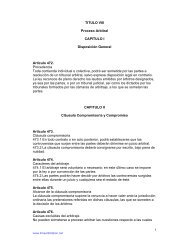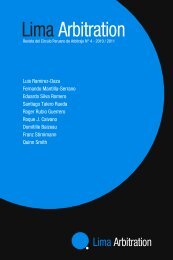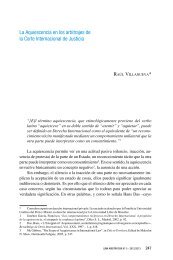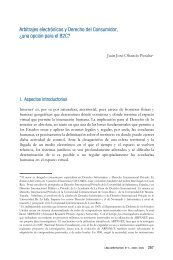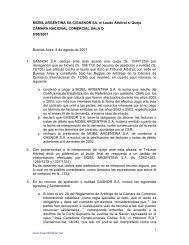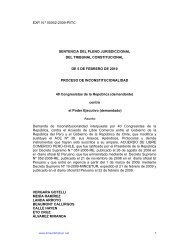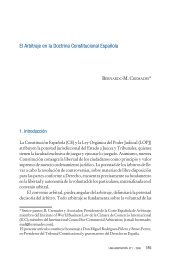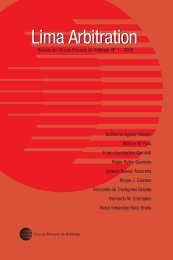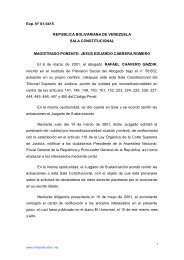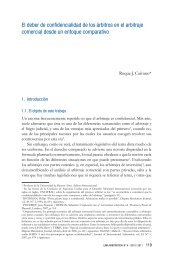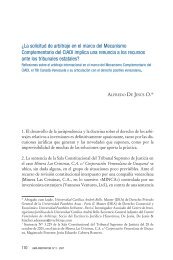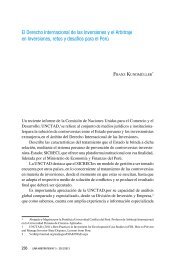Lima Arbitration
Lima Arbitration
Lima Arbitration
You also want an ePaper? Increase the reach of your titles
YUMPU automatically turns print PDFs into web optimized ePapers that Google loves.
GUILLERMO AGUILAR ÁLVAREZ / WILLIAM W. PARK<br />
tantamount to the expropriation of a loan or debt security merely because they<br />
impose an increased cost that causes debtor default. 126<br />
Of special interest are the limitations on investment arbitration that implicate<br />
tax and finance, two areas of particular sensitivity to economic sovereignty.<br />
As discussed below, member states have the right in certain circumstances to<br />
block or to modify Chapter 11 arbitration in both of these domains.<br />
2. Expropriation Through Fiscal Measures<br />
a. Distinguishing Abusive Taxation<br />
Few areas illustrate the complex interaction of arbitration and sovereignty concerns<br />
more sharply than taxation. The power to raise revenue by forced levies is an<br />
attribute of sovereignty that is less negotiable than others. 127 Yet uncompensated<br />
nationalization often takes the form of excessive fiscal measures, designed either to<br />
force the foreign owner to abandon an investment by taxing away its economic<br />
value, or to subject an investor’s competitors to a more favorable tax regime. While<br />
escaping precise definition, such subtler forms of expropriation can arbitrarily deprive<br />
an investor of wealth as effectively as explicit nationalization.<br />
Such «creeping expropriation» does not lend itself to surface-level analysis.<br />
Distinctions must be made between normal and excessive taxation, a task<br />
that implicates culturally influenced notions of the «right» level of tax. 128 From<br />
one perspective, taxation constitutes a form of asset seizure (echoed in the<br />
American catch phrase «the power to tax is the power to destroy») 129 in which<br />
fiscal authorities take money from its current owner (the taxpayer) and give it<br />
to someone else (the state).<br />
126<br />
Id. art. 1110(8), at 642.<br />
127<br />
One remembers that it was a tax revolt that forced King John of England to sign the<br />
Magna Charta in 1215. And few scholars challenge Lord Mansfield’s «Revenue Rule» preventing<br />
enforcement of foreign tax judgments. See Holman v. Johnson, 98 Engl. Rep. 1120,<br />
1121 (K.B. 1775). For later articulations of this principle, see United States v. Boots, 80 F.3d<br />
580 (1st Cir. 1996); HM Queen v. Gilbertson, 597 F.2d 1161 (9th Cir. 1979).<br />
128<br />
Justice Holmes distinguished between a penalty intended as a «discouragement» to behavior<br />
and a tax that «may be part of an encouragement [to actions] when seen in its organic<br />
connection with the whole.» Compañía General de Tabaco de Filipinas v. Collector of<br />
Internal Revenue, 275 U.S. 87, 100 (1927).<br />
129<br />
The phrase originated in McCulloch v. Maryland, in which the United States Supreme<br />
Court struck down a state tax on a federally chartered bank. 17 U.S. (4Wheat.) 316, 327 (1819).<br />
LIMA ARBITRATION. N° 1 - 2006 47


